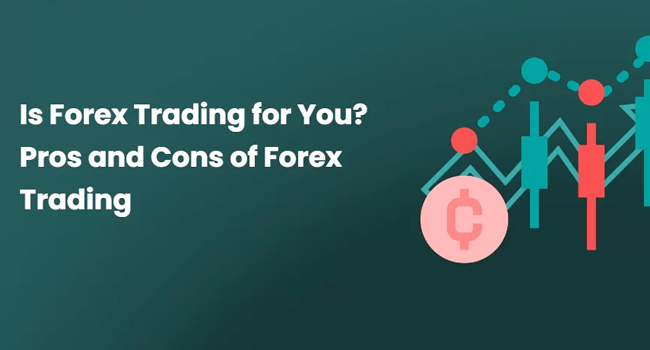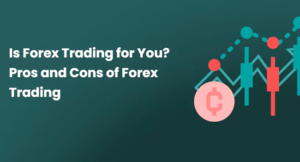Introduction
The Forex market buying and selling, or forex buying and selling, has emerged as a dynamic and lucrative economic marketplace wherein individuals interact with the buying and selling of currencies. With everyday turnover surpassing $6 trillion, the foreign exchange market is the most important and most liquid monetary marketplace globally. As with any investment possibility, foreign exchange buying and selling has benefits and disadvantages. In this text, we can delve into the professionals and cons of foreign exchange buying and selling, highlighting the complexities and opportunities this market provides.
Pros of Forex Trading
High Liquidity
One of the primary blessings of forex buying and selling is its extraordinary liquidity. The total number of participants, including critical banks, monetary establishments, companies, and personal traders, ensures that there is always a customer or vendor available. This high liquidity no longer enables easy access and exit from trades but also results in lower transaction costs.
Accessibility and Flexibility
The Forex market functions 24 hours an afternoon, 5 days every week, due to the worldwide nature of the marketplace. This accessibility allows investors to participate in the market at almost any time, irrespective of their geographical region. Additionally, the power to exchange with one-of-a-kind forex pairs enables buyers to diversify their portfolios and take gain of various marketplace conditions.
Leverage
The Forex market buying and selling gives the capacity for full-size returns using force. Power allows traders to control a massive function with a minimal quantity of capital. While this could amplify earnings, it is crucial to note that leverage increases the hazard of enormous losses. Successful foreign exchange investors appoint danger management techniques to mitigate the negative results of control.
Market Transparency
The forex market is known for its transparency, real-time fee charges, and ease for all individuals. This transparency ensures buyers can make informed decisions based on accurate and updated statistics. Additionally, the absence of insider trading within the forex market contributes to a stage-playing discipline for all individuals.
Diverse Trading Strategies
Forex market trading presents diverse trading strategies, catering to various hazard appetites and time horizons. Traders can pick out from day trading, swing trading, scalping, or lengthy-term investing, relying on their options and market analysis. This flexibility lets individuals tailor their buying and selling methods to align with their monetary dreams.
Diversification Benefits
Forex trading offers a perfect street for portfolio diversification. Since currencies are influenced by myriad factors, including monetary indicators, geopolitical events, and hobby charges, their moves frequently vary from traditional asset training like stocks and bonds. This non-correlation can provide a hedge in opposition to losses in different regions of an investment portfolio.
Cons of Forex Trading
High Risk and Volatility
While the potential for excessive returns exists in foreign exchange trading, so does the threat of significant losses. The foreign exchange marketplace is tremendously risky, and rate actions can be influenced by using diverse geopolitical, financial, and marketplace elements. Traders must be prepared for sudden and unpredictable market shifts that could result in massive financial setbacks.
Complexity and Learning Curve
The Forex market buying and selling calls for deep know-how of monetary indicators, technical analysis, and marketplace trends. The complexity of the marketplace can pose a steep learning curve for amateur buyers. Lack of expertise and experience can also result in poor choice-making and losses. Successful forex investors invest time in training and continuous studying to navigate the intricacies of the marketplace.
Broker Dependence
Forex market buyers depend on brokers to execute their trades, and the selection of a broker can appreciably impact trading effects. Some brokers may additionally have hidden expenses, unreliable systems, or lousy customer service. Traders must cautiously research and select an excellent dealer to ensure steady and honest trading surroundings.
Emotional Challenges
The fast-paced and dynamic nature of forex trading can evoke strong emotions, including fear and greed. Emotional selection-making can cause impulsive movements, deviating from a well-concept-out trading plan. Traders need to broaden discipline and emotional resilience to avoid making decisions primarily based on brief-time period marketplace fluctuations.
Overnight Risk
Unlike traditional stock markets that are near overnight, the forex market operates constantly. This exposes investors to overnight hazards, as significant occasions or marketplace traits can arise during non-trading hours. Traders may wake up to sudden losses or profits, emphasizing the importance of risk control and protection measures like forestall-loss orders.
Regulatory Risks
The decentralized nature of the forex market approach is that it’s miles much less regulated than conventional stock markets. While this lack of centralized oversight allows for flexibility, it exposes buyers to capability fraud and unethical practices. Traders must conduct due diligence on the regulatory environment and pick brokers regulated through professional government to mitigate the chance of fraud.
Conclusion
In conclusion, foreign exchange trading provides enticing possibilities and inherent dangers. Traders want to weigh the pros and cons carefully, considering their chance tolerance, financial dreams, and degree of expertise. Success in forex buying and selling requires skill, subject, and non-stop getting to know. By knowing the complexities of the market and implementing effective risk management techniques, individuals can navigate the world of foreign exchange buying and selling and doubtlessly capitalize on its beneficial possibilities. As with any investment, knowledgeable selection-making is paramount, and traders must technique the forex market with a sensible understanding of its rewards and demanding situations.
FAQs
1. What is the Forex market Trading?
Forex buying and selling, quick for foreign exchange buying and selling, entails the buying and selling currencies on the global marketplace. Traders aim to take advantage of the fluctuations in trade costs among unique forex pairs. The foreign exchange market operates 24 hours a day, five days every week, making it the biggest and most liquid monetary market globally.
2. What are the Main Advantages of Forex Market Trading?
The Forex market trading gives several benefits, which include excessive liquidity, accessibility, flexibility, leverage, and market transparency. The marketplace’s liquidity ensures ease of access and goes out, and its accessibility allows traders to participate from anywhere in the world. Leverage can make more significant income, and market transparency ensures buyers can access actual-time information for knowledgeable decision-making.
3. What are the Risks Associated with Forex Market Trading?
Forex trading comes with inherent risks, which include market volatility, complexity, and the capacity for huge losses. Traders ought to navigate the short-paced and unpredictable marketplace, increase a deep understanding of monetary indicators, and be privy to the emotional challenges that can impact choice-making. Additionally, there is a chance of broker dependence and the want for cautious selection of reliable brokers.
4. How Can I Mitigate Risks in Forex Market Trading?
Mitigating dangers in foreign exchange trading entails enforcing powerful chance control strategies. This includes setting prevent-loss orders to restrict potential losses, diversifying your buying and selling portfolio, staying informed about market developments and monetary indicators, and continuously educating yourself. Additionally, deciding on reliable and controlled broking is essential to reduce the danger of fraudulent activities.
5. Can Anyone Start Forex Market Trading, and What Do I Need to Begin?
Yes, anyone with a right of entry to the net and a modest quantity of capital can start forex trading. First, you will need a laptop or cell tool, a reliable net connection, and a trading account with a reputable foreign exchange dealer. Studying the foreign exchange marketplace, information trading strategies, and working towards a demo account is critical before engaging in stay trading. Continuous education and discipline are essential to fulfilling foreign exchange buying and selling.

